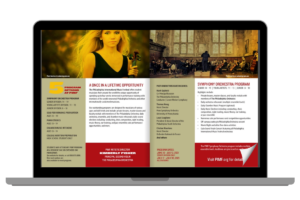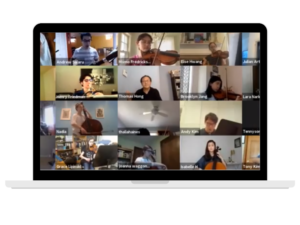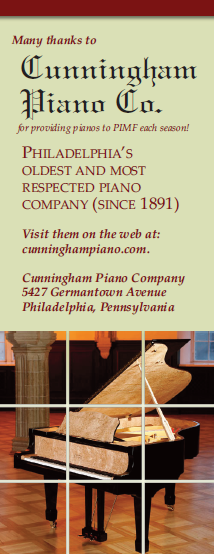John Koen / Acting Assistant Principal Cello / The Philadelphia Orchestra
 John Koen joined The Philadelphia Orchestra in 1990, and in 2011 was made Acting Assistant Principal Cello. He graduated from The Curtis Institute where he studied with David Soyer and Peter Wiley of the Guarneri Quartet.
John Koen joined The Philadelphia Orchestra in 1990, and in 2011 was made Acting Assistant Principal Cello. He graduated from The Curtis Institute where he studied with David Soyer and Peter Wiley of the Guarneri Quartet.
Mr. Koen collaborates in chamber music with artists Emanuel Ax, Joshua Bell, Christoph Eschenbach, Stephen Hough, Lang Lang, Wolfgang Sawallisch, Jean-Yves Thibaudet and many others.
He has performed both as a recitalist and soloist with orchestras across America as well is in Bulgaria, where he has a special mentoring relationship with the New Symphony Orchestra. John has given master classes for Universities in Seoul and Sofia, teaches locally at Temple and Swarthmore and is on the summer music camp faculty of the Philadelphia International Music Festival held each year at Bryn Mawr College in Bryn Mawr Pennsylvania.
We’ve started a conversation with members of the Philadelphia Orchestra about their beginnings in music, their inspirations and aspirations. Please join us for this weekly edition and see many of your new favorites featured right here!
Q: What CD are you currently listening to?
I mostly listen to my iPhone (with headphones) or iTunes on the computer, but I’m teaching Schubert’s Death and the Maiden Quartet, so I found Marian Anderson and Nathalie Stutzmann. Their low notes are awe inspiring!
Q: Is there a genre of music, other than classical, that makes your spirit soar?
I enjoy some Brazilian music, bossa nova (Tom Jobim) as well as Tropocalismo (Caetano Veloso, Gilberto Gil). Much of it reminds me of being on the beach with a cool beverage!
Q: Other than music, what inspires you most?
Reading books, especially novels and literature. They make me think about people and our emotions more than anything else besides music – how we relate to each other, why people feel the things we feel.
Q: Who else in your family is musical?
Interestingly, my Mom’s cousin is a world-famous hand drummer, Glen Velez. He’s lived in New York since I was born, so I’ve actually never met him! His father, Enrique Velez, was a trumpeter in jazz and show bands. My Mom played piano in high school as well, and now one of my cousins is playing violin in middle school.
Q: Who first introduced you to your instrument? What do you remember about the experience?
I’m a big supporter of public school music, because that was where I got my start. I had never heard Classical music until I was 9, when the fifth-grade string orchestra played for us fourth graders, and I signed up to be in the orchestra the next year.
Q: What is your all-time favorite piece (to play, to listen to, etc.)?
I used to have favorites, but if I’m practicing, I play it too much, so I always was to give pieces a break. I do have some rotating favorites, though – Prokofiev’s Romeo & Juliet (complete), Ravel’s Gaspard de la nuit, I’m about to play Schubert’s cello quintet, so that’s another one. I like variety, so I have to put down Edgard Varese’ Arcana and Bach’s Chromatic Fantasy and Fugue, too!
Q: What is it that you like most about this piece?
Ravel’s music has a mysterious, ominous beauty. Prokofiev’s has great tenderness under a spiky exterior, Varese just made really cool sounds, and the Bach is one of those revolutionary pieces in his time period. The Schubert is one of the greatest pieces of all time.
Q: What is your perfect family dinner night?
Interesting flavors with lots of contrast – I recently made a shrimp pasta where the tomato sauce was thickened and made creamy with lemon juice and feta cheese.
Q: Do you always have music on your mind?
Pretty much – it will come and go unbidden.
Q: What element or experience from your childhood still drives you today in your professional life?
I didn’t come from a musical background (My Mom’s piano was sold before I was born), but I fell in love with music and at the same time used my success and talent to get to where I am today. People who are satisfied with themselves become less good, and I always want to improve!
Q: What do you most enjoy teaching?
There has to be a mix of technique and music, but music has to be a part of music-making and playing in lessons. You have to be able to achieve musical aims by having the technique to do things, but I find technique without music pointless.
Q: What changes would you implement at a grade school level to instill a greater interest in music studies?
Music needs to be part of curricula from the beginning – Kindergarten and pre-school. There are so many studies that show the positive effect music study has on academics, but the most important thing is that music is human culture and belongs to everyone!
Q: What is your favorite thing to do when not performing?
Traveling and eating out (especially in foreign countries)! At home, reading books and playing computer games.
Q: What is your favorite piece to hear SOMEONE ELSE perform?
Things that I haven’t played (or not much) like Bartok quartets or contemporary cello concerts like Dutilleux “Tout un monde lointain”
Q: When did you first know that you wanted to be a professional musician?
When I began at age 10! It was something I liked right away, was good at, and when I saw LP (record) covers with pictures of famous soloists and orchestras on them, I wanted to be part of that world, making recordings and traveling playing concerts (I didn’t think of the teaching aspect until later).
Q: Who is your favorite musical icon, living or dead?
Jacqueline De Pre’ – she had such a supreme dedication to her playing, but also a sense of fun, and her story is very sad, but inspiring because she played as long as she was able.
Q: Do you still get nervous before a performance, and if so – how do you cope?
Play slowly so I don’t make a mistake on something I already know right before I go out on stage! Also, I avoid coffee too soon before I go out (I’m an espresso fiend). Deep breaths as well, maybe some light stretching.
Q: What is your general practice routine?
Scales, arpeggios, then pieces. If it’s a piece I know well, I only practice the things I know I need to practice. Students have to do etudes, but I did them when I was your age, and I don’t find most of them musically satisfying – maybe the Piatti caprices, and for a technical challenge, Grutzmacher etudes or Paganini (violin) caprices.
Q: What aspect of making music excites you the most right now?
I enjoy playing with musicians on a very high level so that there is give and take, so I am challenged to become better and hopefully provide a similar inspiration to the other musicians. Broadening of musical insight, with the flexibility of not having every phrase pre-planned.
Q: What is the most unusual musical gig in which you have ever participated?
I play a bit with Network for New Music (Philadelphia), and last year we had an electronic music concert – various instruments playing with electronics of different kinds. It was both difficult because the electronics were an additional member of the group that we had to react to and with, and some of the sounds were more unusual than what we typically make. I am planning on performing one duo for cello and electronics in an upcoming recital.
Q: If you could be anything else in the world, what would it be?
I wouldn’t want to do anything really differently – if I were a conductor, I would still be making music, but I prefer the “hands-on” aspect of playing an instrument. I’m interested in politics and language, but I wouldn’t want to be a translator, and if I were a politician, I’d definitely have to reserve music to avoid the soul-crushing aspects of government.
Q: Do you have any closing thoughts for your followers, fans, and admirers?
Just things my mentors told me – there will be lots of people in life who will tell you what you can’t do, but listen to the ones who tell you what you CAN do! (Thanks, former principal cello Bill Stokking). Music is enough for a lifetime, but a lifetime is not enough for music!



